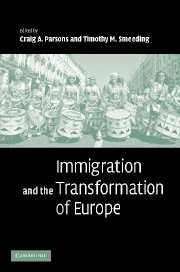Book contents
- Frontmatter
- Contents
- List of figures
- List of tables
- List of contributors
- Acknowledgements
- 1 What's unique about immigration in Europe?
- 2 Europe's immigration challenge in demographic perspective
- 3 Migration into OECD countries 1990–2000
- 4 Divergent patterns in immigrant earnings across European destinations
- 5 Economic consequences of immigration in Europe
- 6 Occupational status of immigrants in cross-national perspective: A multilevel analysis of seventeen Western societies
- 7 Immigrants, unemployment, and Europe's varying welfare regimes
- 8 How different are immigrants? A cross-country and cross-survey analysis of educational achievement
- 9 Immigration, education, and the Turkish second generation in five European nations: A comparative study
- 10 Managing transnational Islam: Muslims and the state in Western Europe
- 11 Migration mobility in European diasporic space
- 12 The new migratory Europe: Towards a proactive immigration policy?
- 13 European immigration in the people's court
- 14 The politics of immigration in France, Britain, and the United States: A transatlantic comparison
- 15 “Useful” Gastarbeiter, burdensome asylum seekers, and the second wave of welfare retrenchment: Exploring the nexus between migration and the welfare state
- 16 The European Union dimension: Supranational integration, free movement of persons, and immigration politics
- 17 The effectiveness of governments’ attempts to control unwanted migration
- Index
- References
2 - Europe's immigration challenge in demographic perspective
Published online by Cambridge University Press: 23 June 2009
- Frontmatter
- Contents
- List of figures
- List of tables
- List of contributors
- Acknowledgements
- 1 What's unique about immigration in Europe?
- 2 Europe's immigration challenge in demographic perspective
- 3 Migration into OECD countries 1990–2000
- 4 Divergent patterns in immigrant earnings across European destinations
- 5 Economic consequences of immigration in Europe
- 6 Occupational status of immigrants in cross-national perspective: A multilevel analysis of seventeen Western societies
- 7 Immigrants, unemployment, and Europe's varying welfare regimes
- 8 How different are immigrants? A cross-country and cross-survey analysis of educational achievement
- 9 Immigration, education, and the Turkish second generation in five European nations: A comparative study
- 10 Managing transnational Islam: Muslims and the state in Western Europe
- 11 Migration mobility in European diasporic space
- 12 The new migratory Europe: Towards a proactive immigration policy?
- 13 European immigration in the people's court
- 14 The politics of immigration in France, Britain, and the United States: A transatlantic comparison
- 15 “Useful” Gastarbeiter, burdensome asylum seekers, and the second wave of welfare retrenchment: Exploring the nexus between migration and the welfare state
- 16 The European Union dimension: Supranational integration, free movement of persons, and immigration politics
- 17 The effectiveness of governments’ attempts to control unwanted migration
- Index
- References
Summary
On January 29, 2004, United Nations Secretary-General Kofi Annan went to the European Parliament in Brussels to accept an award – the Andrei Sakharov Prize for Freedom of Thought. In his acceptance speech he chose to address a topic that his September 2002 report to the United Nations General Assembly identified as a priority issue for the international community: migration. The topic was in the news. A month earlier, with the prompting of the United Nations, a Global Commission on International Migration was established, one of the multiplying recent initiatives that signal an intent to qualify the sovereign right of each nation to make unilateral decisions about immigration. A shorter version of Annan's speech to the EU Parliament received wide distribution; identical texts appeared in leading newspapers in virtually all European countries.
Annan's opening sentences set out the thesis somewhat ambiguously: “One of the biggest tests for the enlarged European Union, in the years and decades to come, will be how it manages the challenge of immigration. If European societies rise to this challenge, immigration will enrich and strengthen them. If they fail to do so, the result may be declining living standards and social division.” But the Secretary-General went on to explain that the challenge is to adopt policies that accommodate greater immigration: “There can be no doubt that European societies need immigrants. Europeans are living longer and having fewer children. Without immigration … jobs would go unfilled and services undelivered, as economies shrink and societies stagnate.
- Type
- Chapter
- Information
- Immigration and the Transformation of Europe , pp. 30 - 42Publisher: Cambridge University PressPrint publication year: 2006
References
- 1
- Cited by



